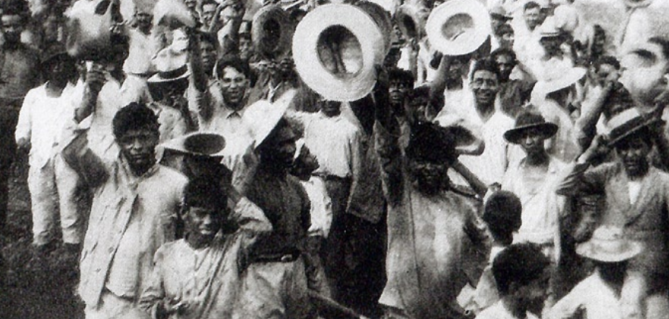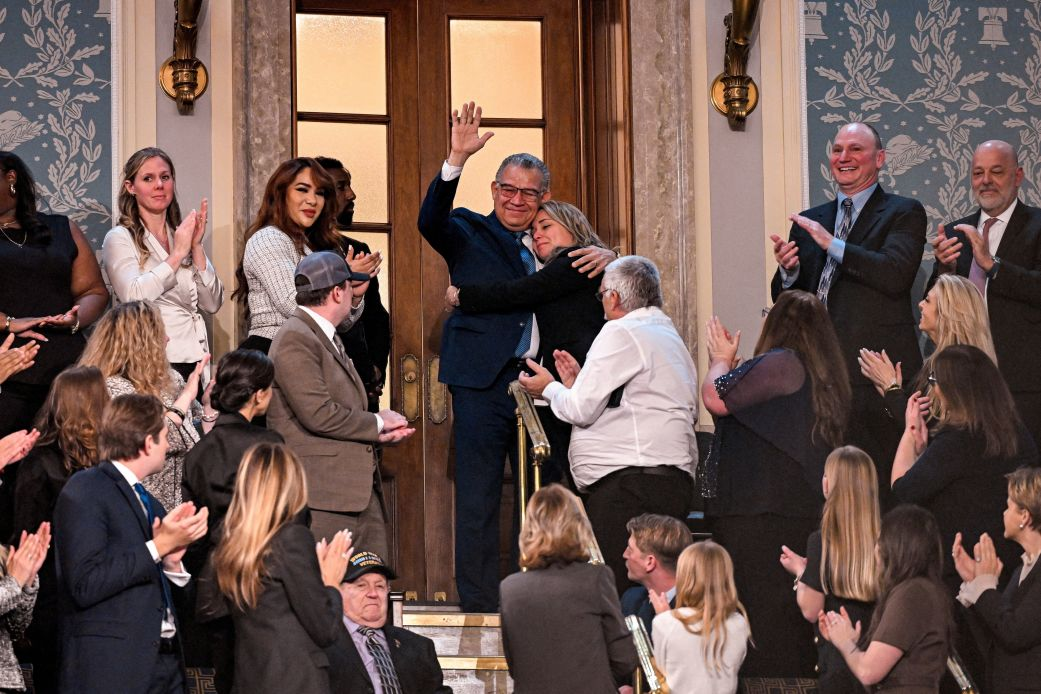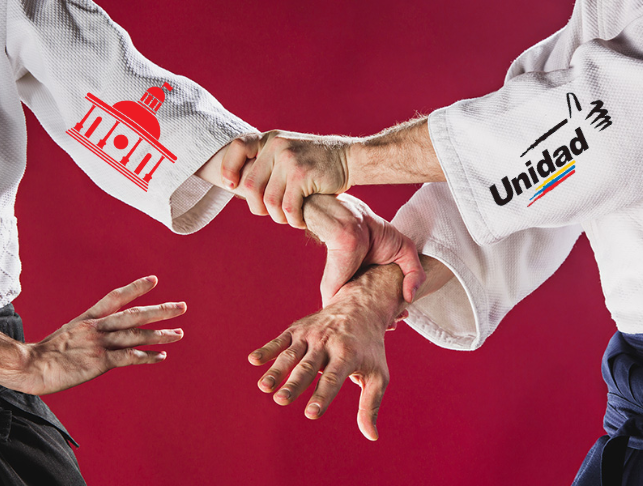Who Will Reinvent Democratic Struggle in Venezuela?
Building true bottom-up power in this new era requires discarding misleading notions of democracy and returning to fundamental practices

To command and obey, instead of opposing, become the two inseparable terms of a single relationship —Paul Vernant
A year after the presidential elections of July 28, 2024, it’s clear that the opposition failed to claim its victory and that what we once called Schrödinger’s Tyranny is alive and well inside its box. The secret to its survival is simple: an exhaustive repression that suppresses even the possibility of resistance and organization, and a semi-clandestine diplomacy through which it has built a new normal.
The leadership of María Corina Machado proved insufficient. Not because the dictatorship remains in place, but because of her lack of preparation for an inevitable fraud, her failure to seize opportunities at the right moment—including ignoring the popular unrest that followed the elections—and, above all, because she retreated into military fantasies that left no room for collective action by Venezuelans.
At this point, it’s evident that the leadership of all sectors of the traditional opposition is inadequate for a democratic struggle. What is needed is something new. But leadership is not just about bosses giving orders; it’s about a collective capacity to define lines of action. Faced with leaders who command more than they lead, the task isn’t just to change names or parties, but to change references and the problems we set out to solve.
Democracy is more of a collective capacity, a tendency. There aren’t truly democratic regimes, but rather democratic tendencies within certain regimes.
A proper name
An early symptom of de-democratization is the loss of clarity about what democracy actually is—even among those who claim to defend it. Sometimes it becomes a metaphor for something else (elections, popular assemblies, strongmen, civilization). Other times it becomes so vague and utopian that it seems only achievable in a classless society or after the second coming of the messiah.
In both cases, the result is conformism. Minimalist definitions invite us to settle for something that’s not really democracy, while idealistic ones make democracy seem too good to be true. But the real confusion begins when we’re told democracy is a regime, when in fact it’s more of a collective capacity, a tendency. There aren’t truly democratic regimes, but rather democratic tendencies within certain regimes.
Historians have long shown that, in antiquity, democracy referred to a power—kratein—exercised collectively by citizens or demos, simultaneously commanding and obeying. A power without bosses, where there could certainly be leaders, strategists, delegates, or coordinators, but not heads turning others into limbs that merely obey, even consensually. The word resurfaced in modern times and shed its negative connotations because that same ancient problem was redefined again and again.
Tragically, the only politician who even attempted to address the issue of empowering the Venezuelan people was Chávez, in an effort to launder his image as a coupster.
There has probably never been a pure “collective self-government by citizens,” but democracy is still the proper name of something real: the strategies used by ordinary people not only to govern themselves, but to govern those who rule them—be they heads of state, politicians, or more powerful citizens seeking to dominate or exploit them.
When even the humblest manage to claim citizenship (a privilege that was never intended for them) and gain at least some ability to govern their rulers, set limits, choose and remove them, and even push them into action or inaction, then we begin to talk about democratization.
Sometimes this is achieved by overthrowing rulers and replacing them. Other times, by forging explicit or implicit pacts with them. It has been done through reforms and through revolutions. What is certain is that democratization always involves conflict, sometimes violence, but also institutions like universal suffrage, freedom of expression, and the right to strike and protest—tools through which this collective power can be exercised over time.
Governing the government
Narratives about Great Leaders conveniently forget that it was the uprising following the death of Juan Vicente Gómez and the demonstration of February 14, 1936, that pushed Eleazar López Contreras to open up. That it was the strikes and the formation of labor unions that made the Ley del Trabajo (Labor Law) necessary that same year. That the delay in granting universal suffrage led to the drama of 1945–48. That the rejection of Pérez Jiménez’s plebiscite in December 1957 paved the way for his fall in January 1958.
Whether it’s Chávez declaring that he is the people and that nothing existed before him, or the nostalgic tales of puntofijismo about great statesmen—these narratives turn demokratia into a tragic metaphor for the power of Great Leaders to whom Venezuelans owe obedience. And as the Venezuelan demos disappeared—made invisible or turned into decorative props of populist rhetoric—so did the little power they once held.
So when one politician hands over the presidential sash to another, it says as little about democracy as thousands of popular assemblies in poor neighborhoods. What do these images really tell us about the people’s political capacity to act? Peaceful transfers of power can occur in corrupt oligarchies, and popular assemblies can decorate bloody dictatorships.
Tragically, the only politician who even attempted to address the issue of empowering the Venezuelan people was Chávez, in an effort to launder his image as a coupster. Meanwhile, the traditional political class—except for some like the ill-fated Causa R—trained under puntofijismo never even considered that a topic worth discussing.
We must return to basics as in the dawn of modern democracies: discussion circles and clubs, mutual aid societies, struggles for fundamental rights, maybe even secret societies…
An authoritarian faction of a political class, now in power, offered a wonderful “participatory democracy” that was, in reality, hyper-localized power used to control their base and keep them away from national affairs (even from those of their own municipality) while they captured the state.
The opposition’s more oligarchic faction has championed “representative democracy,” where followers are treated like electoral cattle and politicians are only accountable to each other over glasses of whisky. This second model was not incompatible with the first (ordinary chavistas, more than anyone, were treated like voting cattle), but the authoritarian faction, unwilling to share power with anyone, proved more efficient.
Democracy can be participatory or representative, direct or delegative at the level of methods. But what truly defines democracy are the ends. To know whether democracy exists in a particular time and place, we must ask: what capacity do ordinary people have to control and shape the public sphere, to govern their governors, and to determine their own fate? That’s when we’ll know how much democracy we actually have.
Strikes, uprisings, elections, assemblies, legal actions, pacts and agreements, armed struggle, legislative action, civil disobedience, popular education, institutional routines—all of these have been, can be, and will be used in democratic struggles. Alongside others yet to be invented. Democracy has always been a kind of mixed martial art—like the ancient pankration—constantly reinventing itself in response to new adversaries.
The new problem
True to form, Venezuela’s opposition factions have always focused on transition and power transfer, fetishizing the presidential sash: from Carmona’s self-swearing-in, to Ramos Allup posing for Hola! magazine, to Guaidó and the humanitarian aid trucks, to María Corina Machado and the actas. Their obsession has been the magic move that places an opposition leader in power overnight. This fetishism reveals their simplicity and short-term thinking.
Building a truly democratic power base that could, depending on the situation, pressure, contain, overthrow, or force the dictatorship into negotiation was never their concern—not when they had parliamentary seats and regional governments, not when only street mobilization and civil disobedience remained, and certainly not now, when repression has emptied the streets and a WhatsApp message can land you in jail.
It is chavismo that has constantly redefined the problems, evolving from caudillismo to dictatorship. And a year ago, by effectively abolishing elections, it has ironically forced us to redefine our own problem—not how to elevate opposition politicians to power, but how to build democratic power.
The old saying went that there are mucho cacique y poco indio (“too many chiefs and not enough Indians.”) We could say now there are too many bosses and too few leaders.
In the face of global autocratization, the challenges are similar everywhere. So is the adversary: a kind of autocracy that wages war on the population, using kidnapping and deportation as models, and seeks to turn citizenship into a privilege—or simply erase it. But while in other countries the struggle may happen in courts, parliaments, the media, or the streets, in Venezuela we don’t even have a battlefield, a “theater of operations.”
We must return to basics as in the dawn of modern democracies: discussion circles and clubs, mutual aid societies, struggles for fundamental rights, maybe even secret societies, and from there attempt to build the democratic power that Chávez reduced to a metaphor of his megalomania, and that our oppositions—from Salas Römer in 1998 to Machado last year—never truly tried to build.
That might be impossible or unlikely at this point. But change begins with understanding that the issue is not replacing one set of bosses with another (or installing our bosses in Miraflores) but empowering ordinary people, giving them the means to respond, to escape helplessness. Those who understand this, who can make others understand it, and who can identify lines of action to make it happen—those will be the leaders of the future.The old saying went that there are mucho cacique y poco indio (“too many chiefs and not enough Indians.”) We could say now there are too many bosses and too few leaders. And it’s true that we need leaders, millions of them. And when we have them, and we’ve pulled ourselves out of our own helplessness, we will be able to collect what the bosses owe us.
Dedicated to all those who risked their lives in the streets one year ago.
Caracas Chronicles is 100% reader-supported.
We’ve been able to hang on for 22 years in one of the craziest media landscapes in the world. We’ve seen different media outlets in Venezuela (and abroad) closing shop, something we’re looking to avoid at all costs. Your collaboration goes a long way in helping us weather the storm.
Donate




